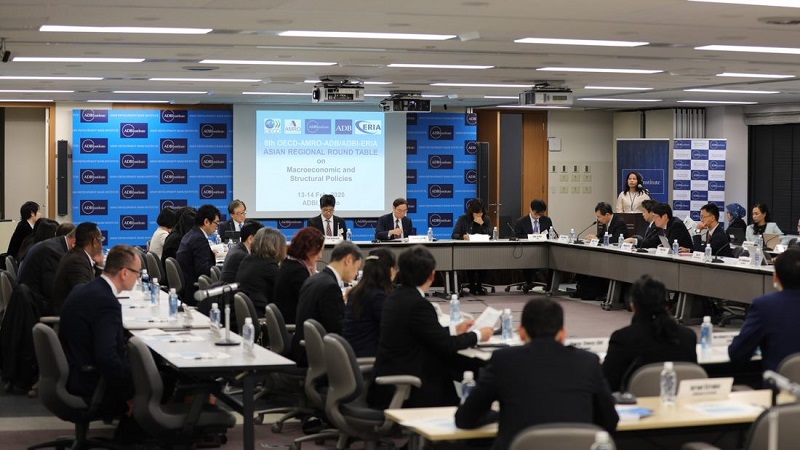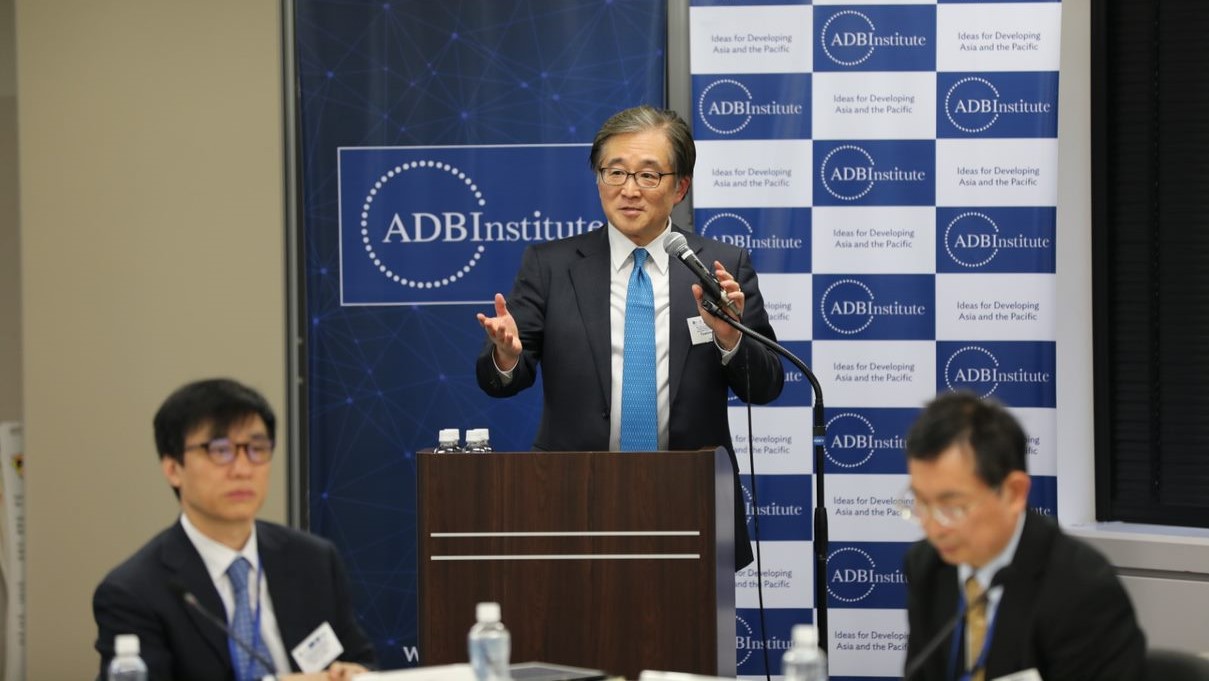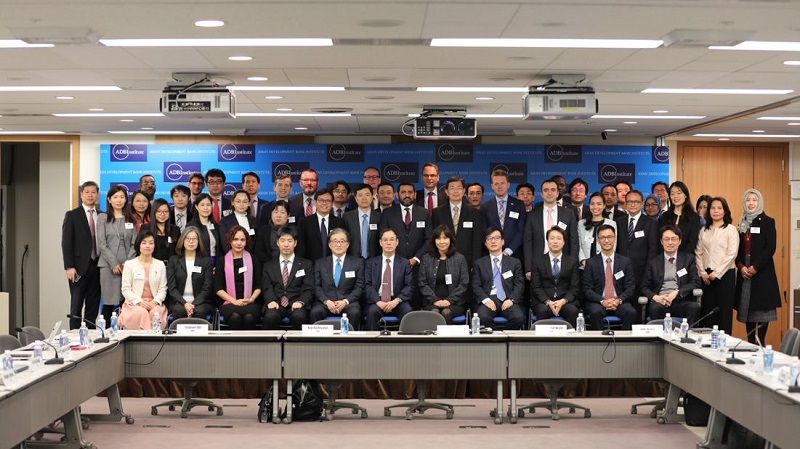Events
8th OECD-AMRO-ADB/ADBI-ERIA Asian Regional Roundtable on Macroeconomic and Structural Policies
8th OECD-AMRO-ADB/ADBI-ERIA Asian Regional Roundtable on Macroeconomic and Structural Policies
13-14 February 2020
Contact: enquiry@amro-asia.org
The OECD-AMRO-ADB/ADBI-ERIA Asian Regional Roundtable convenes leading experts from Asian countries and the OECD to discuss the issues at the fore of recent economic developments in the region. It serves as a platform for knowledge sharing between the OECD, AMRO, ADB/ADBI, ERIA and Emerging Asia’s policy makers, as well as academics and the private sector. The roundtable also provides opportunities for dialogue on near-term macroeconomic policies and medium-term growth and development challenges including the linkages between near-term and medium-term issues, current agendas as well as future challenges in Emerging Asian economies.
Through five sessions, this year’s roundtable will address recent domestic, regional and global trends that are changing the environment facing Emerging Asia’s policy makers. In the first session the topic of economic bubbles and financial stability will be discussed. The second session will address deflation in Emerging Asia. Innovation in Asia will be the topic of the third session. On the second day, the fourth session will discuss the topic of Global Value Chains in ASEAN+3. The final session will explore trade facilitation and regulatory capacities.
Previous roundtables were held in Singapore, Manila, Tokyo and Jakarta and focused on various topics including Euro-area economic uncertainty and its implications for Asian economies, new growth models in Asia, the impact of monetary easing in the OECD on the Asian economies, middle-income trap, challenges in energy sector, digitalisation, global trade and multilateralism, education, urbanisation, smart cities, fiscal sustainability in an aging population, infrastructure and connectivity, as well as some other topics.
The event is by invitation only.
Program
Speakers
Naoyuki Yoshino
Dean, Asian Development Bank Institute (ADBI)/Asian Development Bank (ADB)

Naoyuki Yoshino
Dean, Asian Development Bank Institute (ADBI)/Asian Development Bank (ADB)
Yumiko Murakami
Head of Tokyo Centre, OECD

Yumiko Murakami
Head of Tokyo Centre, OECD
Toshinori Doi
Director, ASEAN+3 Macroeconomic Research Office (AMRO)

Toshinori Doi
Director, ASEAN+3 Macroeconomic Research Office (AMRO)
Koji Hachiyama
COO, Economic Research Institute for ASEAN and East Asia (ERIA)

Koji Hachiyama
COO, Economic Research Institute for ASEAN and East Asia (ERIA)
Chul Ju Kim
Deputy Dean, Asian Development Bank Institute (ADBI)

Chul Ju Kim
Deputy Dean, Asian Development Bank Institute (ADBI)
Cyn-Young Park
Director, Economic Research and Regional Cooperation Department, ADB

Cyn-Young Park
Director, Economic Research and Regional Cooperation Department, ADB
Matthias Helble
Economist, Economic Research and Regional Cooperation Department, ADB

Matthias Helble
Economist, Economic Research and Regional Cooperation Department, ADB
Masyita Crystallin
Economist, Indonesian and The Philippines DBS Group Research

Masyita Crystallin
Economist, Indonesian and The Philippines DBS Group Research
Kensuke Tanaka
Head of Asia Desk, OECD Development Centre

Kensuke Tanaka
Head of Asia Desk, OECD Development Centre
Prasiwi Ibrahim
Deputy Head of Asia Desk, OECD Development Centre

Prasiwi Ibrahim
Deputy Head of Asia Desk, OECD Development Centre
Pornpen Sodsrichai
Director, Economic Analysis Office, Bank of Thailand

Pornpen Sodsrichai
Director, Economic Analysis Office, Bank of Thailand
Reza Anglingkusumo
Director/Head of Research Center, Bank Indonesia Institute, Bank Indonesia

Reza Anglingkusumo
Director/Head of Research Center, Bank Indonesia Institute, Bank Indonesia
Ho Sui Jade
Deputy Director, Monetary Policy Department, Bank Negara Malaysia

Ho Sui Jade
Deputy Director, Monetary Policy Department, Bank Negara Malaysia
Patrick Hess
Principal Expert, European Central Bank

Patrick Hess
Principal Expert, European Central Bank
Abdul Abiad
Director, Macroeconomic Research Division, ADB

Abdul Abiad
Director, Macroeconomic Research Division, ADB
Donghyun Park
Macroeconomic Research Division, ADB

Donghyun Park
Macroeconomic Research Division, ADB
Banri Ito
Professor, Aoyama Gakuin University

Banri Ito
Professor, Aoyama Gakuin University
Bihong Huang
Asian Development Bank Institute (ADBI)

Bihong Huang
Asian Development Bank Institute (ADBI)
Hidetoshi Nishimura
President, Economic Research Institute for ASEAN and East Asia (ERIA)

Hidetoshi Nishimura
President, Economic Research Institute for ASEAN and East Asia (ERIA)
Daikichi Momma
Advisory Panel Member, AMRO

Daikichi Momma
Advisory Panel Member, AMRO
Lam San Ling
AMRO Consultant

Lam San Ling
AMRO Consultant
Jong Woo Kang
Principal Economist (Regional Cooperation and Integration Division, Economic Research and Regional Cooperation Department), ADB

Jong Woo Kang
Principal Economist (Regional Cooperation and Integration Division, Economic Research and Regional Cooperation Department), ADB
Aladdin Rillo
Deputy Secretary-General, ASEAN Secretariat

Aladdin Rillo
Deputy Secretary-General, ASEAN Secretariat
Anita Prakash
Director of Policy Relations, ERIA

Anita Prakash
Director of Policy Relations, ERIA
Rashesh Shrestha
Economist, ERIA

Rashesh Shrestha
Economist, ERIA
Doan Thi Hanh
Economist, ERIA

Doan Thi Hanh
Economist, ERIA
Masahito Ambashi
Economist, ERIA

Masahito Ambashi
Economist, ERIA
Photos



